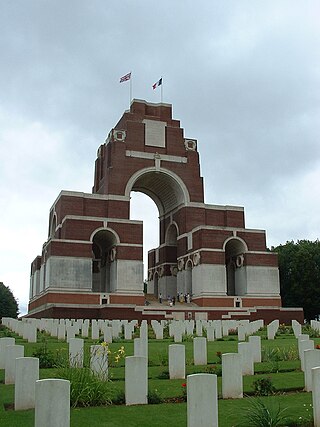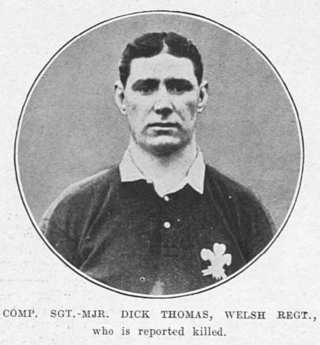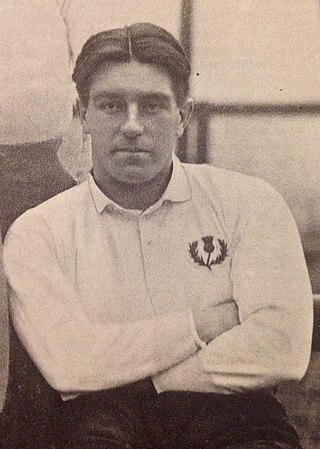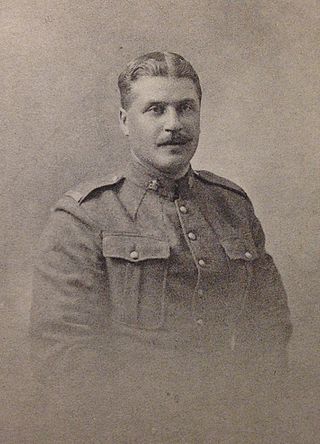
The Thiepval Memorial to the Missing of the Somme is a war memorial to 72,337 missing British and South African servicemen who died in the Battles of the Somme of the First World War between 1915 and 1918, with no known grave. It is near the village of Thiepval, Picardy in France. A visitors' centre opened in 2004. Designed by Sir Edwin Lutyens, Thiepval has been described as "the greatest executed British work of monumental architecture of the twentieth century".

Ronald 'Ronnie' William Poulton was an English rugby union footballer, who captained England. He was killed in the First World War during the Second Battle of Ypres.

Cecil Halliday Abercrombie was a Scottish international rugby union player, first-class cricketer, and an officer in the Royal Navy. Abercrombie passed out from the Britannia Royal Naval College into the Royal Navy in 1902, and shortly thereafter he served abord HMS Hyacinth in the British campaign in Somaliland, being part of the force that captured "Mullah" Hassan's stronghold in 1904. He would later served aboard HMS Defence at the Battle of Jutland on 31 May 1916, during which he was killed in action.

John Lewis Williams was a Welsh international wing who played club rugby for Cardiff Rugby Football Club. A three times Triple Crown winner, out of seventeen appearances for Wales he was on the losing side only twice.

David Revell "Darkie" Bedell-Sivright was a Scottish international rugby union forward who captained both Scotland and the British Isles. Born in Edinburgh, and educated at Fettes College where he learned to play rugby, he studied at Cambridge University and earned four Blues playing for them in the Varsity Match. He was first selected for Scotland in 1900 in a match against Wales. After playing in all of Scotland's Home Nations Championship matches in 1901, 1902 and 1903, Bedell-Sivright toured with the British Isles side – now known as the British & Irish Lions – that toured South Africa in 1903. After playing the first 12 matches of the tour, he was injured and so did not play in any of the Test matches against South Africa.

William Purdon Geen was a rugby union wing and centre, who represented Wales, and played club rugby for Oxford University and Newport and county rugby for Monmouthshire. He was also invited to play for the Barbarians on several occasions. Geen unsuccessfully trialled for England in 1910, but was selected and played for Wales on three occasions in the 1912–1913 season. Injury prevented him from playing more internationals, and his service in the First World War put an end to his career.

Edward John Richard Thomas was a Welsh international rugby union back who played club rugby for Mountain Ash.
David Dickie Howie was a rugby union player, who represented Scotland and Kirkcaldy RFC. He enlisted as a trooper in the local yeomanry in September 1914, at the start of the First World War. After undergoing training in England, he was commissioned second lieutenant in the Royal Field Artillery in April 1915 and despatched to Gallipoli in August. During the evacuation of Anzac Bay, he contracted pneumonia, and died in Cairo, Egypt, after shooting himself with a revolver while in a state of delirium. He is buried at the Cairo War Memorial Cemetery.

Eric "Puss" MacLeod Milroy was a rugby union player who represented Scotland and Watsonians. He was capped twelve times for Scotland between 1910 and 1914, his first appearance coming as a surprise replacement for the Scottish captain, George Cunningham. He was selected for the 1910 British Isles tour to South Africa after other players were forced to withdraw. Due to illness, he only participated in three matches, and did not take part in any of the tests against South Africa. In 1914, he captained Scotland against Ireland, and against England in the last international match before the outbreak of the First World War.

Lieutenant-Commander John Skinner Wilson was a Trinidad-born rugby player, who represented Scotland, United Services RFC and London Scottish FC. He enrolled in the Royal Navy in 1898. He was killed in World War I in the Battle of Jutland, serving as Lieutenant-Commander aboard HMS Indefatigable. He is remembered on panel 10 at the Plymouth Naval Memorial.

Walter Michael "Mike" Dickson was a rugby union player, who represented Scotland, Blackheath and Oxford. He was killed in World War I.

William "Willie" Middleton Wallace was a rugby union player. He played fullback for Cambridge University RFC and was capped for Scotland in 1913–14.

Pte. Andrew Ross was a Scottish rugby union player from Edinburgh. He worked in the Merchant Navy as a marine engineer. He played for Royal High School FP and was capped several times for Scotland between 1905 and 1909.
Tobias "Toby" Mortimer Moll was a South African rugby union player from Cape Town. He was awarded a single cap for South Africa on 27 August 1910, against the British Isles team on its 1910 tour of South Africa. He played for Randfontein RFC, Transvaal, and Western Province.

Arthur "Mud" James Dingle was a rugby union centre and wing, who won three caps for England, and played for County Durham, Hartlepool Rovers and Oxford University.

Francis Nathaniel Tarr was an English international rugby union player. He played centre for the Leicester Tigers and, between 1909 and 1913, won four caps for England, scoring two tries. He also earned three Blues while reading law at Oxford.
Robert Laurence Pillman was an English rugby union player. He was the brother of Cherry Pillman. He played once for England, against France in the 1914 Five Nations Championship. He was killed in action while serving with the British Army during the First World War.
Henry Grierson was an English cricketer, barrister and author, who played cricket for Bedfordshire between 1909 and 1921 and for Cambridge University from 1911 to 1912.

Major Robertson "Robbie" Stewart Smyth was an international rugby player, who represented Ireland and Great Britain. Born in County Down, Ireland, he went to Dungannon Royal School, then studied medicine at Trinity College, Dublin, where he obtained his doctorate in 1904. After a year as house surgeon at Sir Patrick Dun's Hospital, he was commissioned into the Royal Army Medical Corps in 1906, and went to India the following year.














